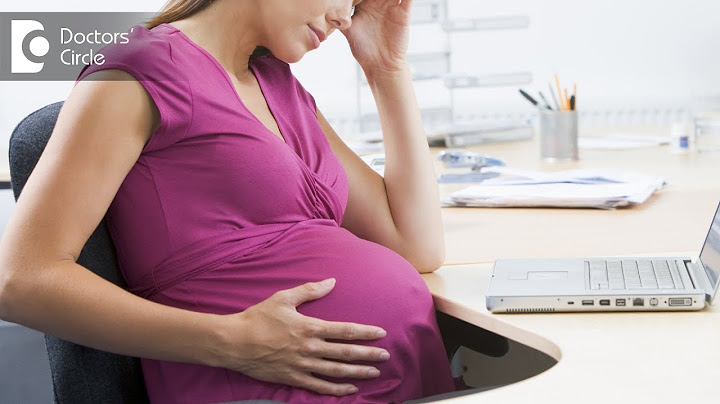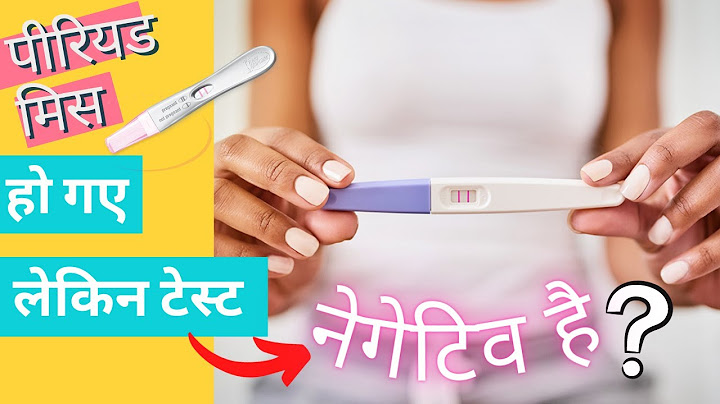01/5All you need to know about pregnancy tests Show
Whether it comes as a surprise or you have spent months trying to conceive, taking a pregnancy test is a crucial step that can be very stressful for women. Whatever be the outcome, taking pregnancy test is one of the earliest measures you take to settle your doubts. However, knowing the right time or the day to take a pregnancy test goes one step further to clarify doubts. Here's a brief explainer: readmore02/5When should you take a test?Usually, a missed or a delayed period is the first mark that makes you rush out to get a pregnancy test. However, you should always wait for a certain time before you take a test. Taking a test one or two weeks after you have had sex or ten days after you missed your periods is the right time to confirm your doubts. The reason the waiting time is important is that for the pregnancy to be confirmed, an essential pregnancy hormone, hCG needs to be detected and this usually happens 7-12 days after the egg gets fertilized and the implantation cycle is complete. Once this happens, the hormones start to double up, every 48 hours and ensure the correct outcome on the test. Otherwise, even if you take the test at an earlier time, it can lead to negative results, even if you are pregnant as hCG levels won't be properly matched. readmore03/5Check for hCG levels!Depending on the type of test you go for, you can get your results early. Some home pregnancy tests are sensitive and can detect hCG levels as early as four days before your period date. readmore04/5When to take a blood pregnancy test?What you can also do is take blood pregnancy tests, especially if you have been getting a lot of negatives on your home pregnancy tests but have reason to believe that you are pregnant. While home pregnancy tests measure the levels of hCG hormones, blood pregnancy tests are far more sensitive, accurate and check for hCG levels in the blood. Again, a good time to take a test would be several days late. Blood pregnancy tests can also be a good option to consider for women who have experienced miscarriage, pregnancy complications or health risks in the past. This way, the most crucial first weeks of your pregnancy will be closely observed. readmore05/5What is the best time to take a test?Much like the day, the time of the day is also a hotly debated topic. According to experts, pregnancy tests will be the most accurate if taken in the morning, on your first pee. This is because as compared to night time, morning pee has a higher concentration of hCG hormones. Unlike other urine tests, it is not important that you drink more water than usual. Doing so can dilute your urine, alter results and make it more likely to get to see false-positives on the test. Goes without saying, if you see a negative result or observe false positives, you can repeat the test. readmoreCould you be pregnant? Get answers to common questions about home pregnancy tests. By Mayo Clinic StaffTaking a home pregnancy test can be nerve-wracking, especially if you're not sure you can trust the results. Know when and how to take a home pregnancy test — as well as some of the possible pitfalls of home testing. When should I take a home pregnancy test?Many home pregnancy tests claim to be accurate as early as the first day of a missed period — or even before. You're likely to get more accurate results, however, if you wait until after the first day of your missed period. Why wait? Shortly after a fertilized egg attaches to your uterine lining (implantation), the placenta forms and produces the hormone human chorionic gonadotropin (HCG). This hormone enters your bloodstream and urine. During early pregnancy, the HCG concentration increases rapidly — doubling every two to three days. The earlier you take the home pregnancy test, the harder it might be for the test to detect HCG. Keep in mind that the timing of your ovulation might vary from month to month, and the fertilized egg can implant in the uterus at different times. This can affect the timing of HCG production and when it can be detected. If your periods are irregular, you might miscalculate when your period is due. If it's important to confirm your pregnancy right away and depending on how far along you are in your pregnancy, your health care provider might recommend that you have an ultrasound, repeat a urine test at a lab or have a blood test to measure your HCG levels. Are there different types of home pregnancy tests?With most tests, you place the end of a dipstick in your urine stream or dip the dipstick in a container of collected urine. A few minutes later, the dipstick reveals the test result — often as a plus or a minus sign, one line or two lines, or the words "pregnant" or "not pregnant" on a strip or screen. Follow the test instructions for how long to wait before checking results — usually two or more minutes. Most tests also have a control indicator — a line or symbol that appears in the result window. If the line or symbol doesn't appear, then the test isn't working properly. Try again with another test. Some home pregnancy tests are more sensitive than others. In other words, the amount of HCG needed to be detected in the urine to produce a positive test result is lower in some tests. Always check the test's expiration date and read the instructions carefully before you take the test. How accurate are home pregnancy tests?Many home pregnancy tests claim to be 99 percent accurate. However, home pregnancy tests differ in the ability to diagnose pregnancy in women who have recently missed a period. If you have a negative test but think you might be pregnant, repeat the test one week after your missed period or talk to your health care provider. Could medications interfere with test results?Fertility drugs or other medications that contain HCG might interfere with home pregnancy test results. However, most medications, including antibiotics and birth control pills, don't affect the accuracy of home pregnancy tests. Could a positive result be wrong?Although rare, it's possible to get a positive result from a home pregnancy test when you're not actually pregnant. This is known as a false-positive. A false-positive might happen if you had a pregnancy loss soon after the fertilized egg attached to your uterine lining (biochemical pregnancy) or you take a pregnancy test too soon after taking a fertility drug that contains HCG. An ectopic pregnancy, menopause or problems with your ovaries also might contribute to misleading test results. Could a negative result be wrong?It's possible to get a negative result from a home pregnancy test when you're actually pregnant. This is known as a false-negative. You might get a false-negative if you:
What happens next?Based on your test results, consider taking the following steps:
Sign up for free, and stay up to date on research advancements, health tips and current health topics, like COVID-19, plus expertise on managing health. To provide you with the most relevant and helpful information, and understand which information is beneficial, we may combine your email and website usage information with other information we have about you. If you are a
Mayo Clinic patient, this could include protected health information. If we combine this information with your protected health information, we will treat all of that information as protected health information and will only use or disclose that information as set forth in our notice of privacy practices. You may opt-out of email communications at any time by clicking on the unsubscribe link in the e-mail. Feb. 24, 2021
See more In-depth Products and Services
See also
. Can you detect a pregnancy at 1 week?You cannot detect pregnancy at week one since the hormonal changes detected by the at-home pregnancy tests haven't started happening in your body yet.
Can you feel pregnant after 2 days?Early symptoms of pregnancy are usually different for every woman. Some women might experience the first symptoms a week or two after conceiving, whereas others don't feel anything for months.
|

Related Posts
Advertising
LATEST NEWS
Advertising
Populer
Advertising
About

Copyright © 2024 paraquee Inc.


















